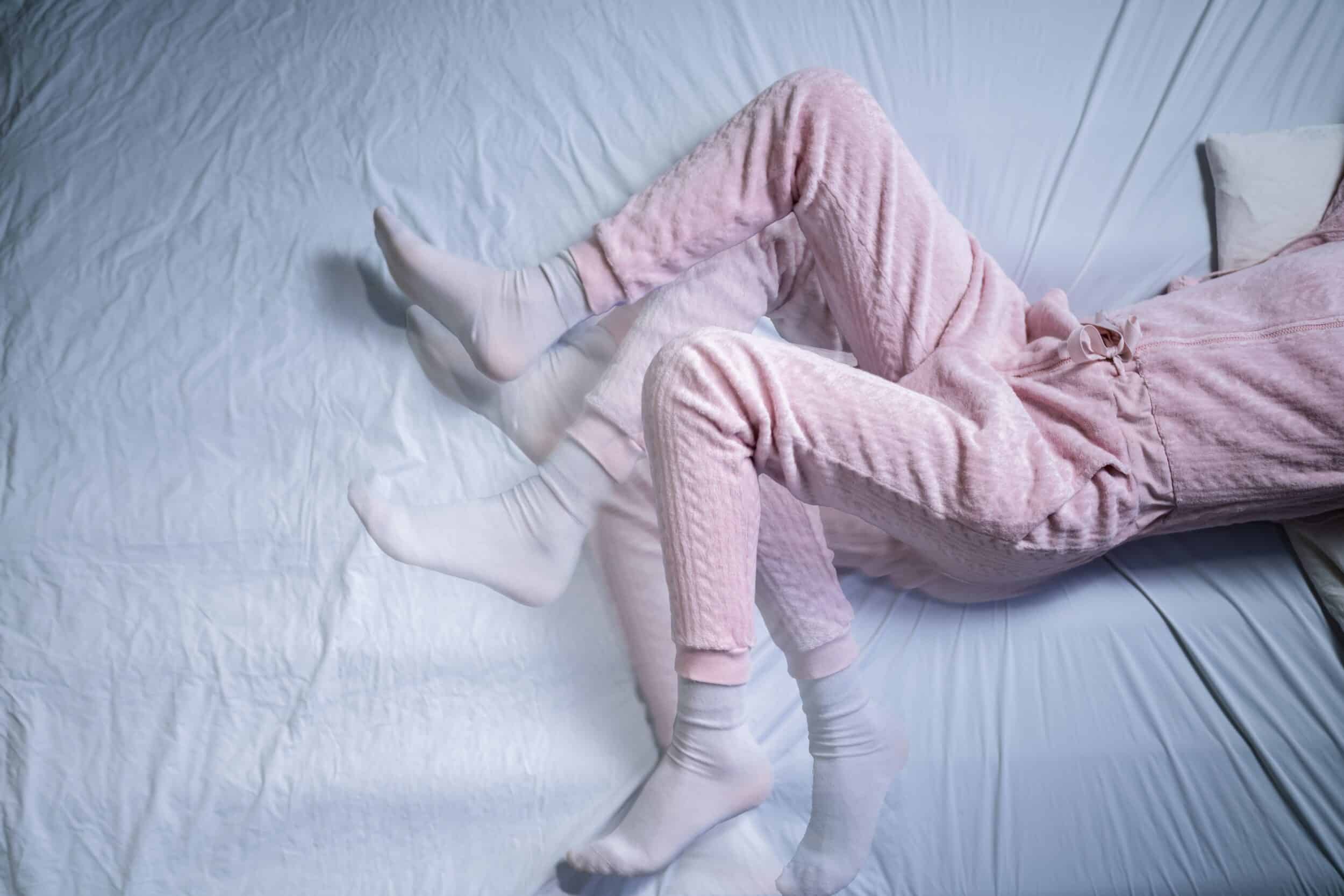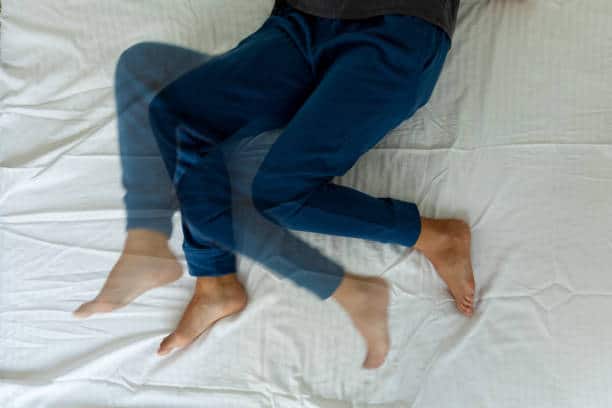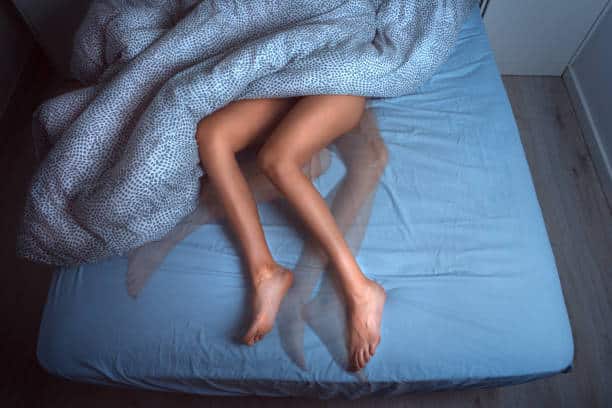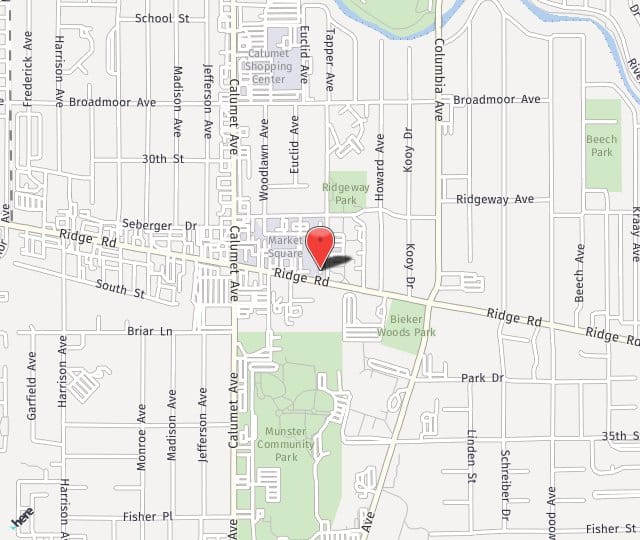At Region Vein in Munster, IN, board-certified vein specialist Dr. Demetrios J. Karamichos leads the way in diagnosing and treating restless leg syndrome (RLS.) We don't just treat symptoms—we address their root causes. Vein disease, particularly venous insufficiency, is a common but little-known cause of RLS. As vein disease experts, we help patients with RLS find real relief and enjoy healthy, active lives again.

What is Restless Leg Syndrome (RLS)?
Do you sometimes find yourself struggling to sleep at night because of an uncontrollable urge to move your legs? Or do you experience a creeping, tingling, or burning sensation in your legs that makes it difficult to rest or relax? You might be experiencing Restless Leg Syndrome (RLS), a common condition that affects up to 15% of the population.
RLS can be particularly frustrating because the symptoms tend to worsen at night or during rest periods, making it difficult to get a good night's sleep. This can not only impact your well-being but can also affect the sleep of those around you, including your partner.
Symptoms of Restless Leg Syndrome
The symptoms of RLS include:
- Irresistible urge to move the legs
- Creeping feeling in the legs
- Tingling or burning sensation in the legs
- Leg numbness
- Constant leg movement during sleep
- Disrupted sleep, which can affect daily activities and mood
It's important to note that RLS symptoms can occur during the day or at night but are often worse at night or when you're trying to relax.
Restless Leg Syndrome Diagnosis

RLS can be a frustrating and uncomfortable condition that can affect your quality of life. If you're experiencing the symptoms mentioned above, you may have RLS. We encourage you to schedule a consultation with our team at Region Vein. We can perform a noninvasive duplex ultrasound of your legs to determine whether you have underlying venous insufficiency that may be contributing to your RLS symptoms.
From there, Dr. Karamichos and our team can work with you to develop a personalized treatment plan and help you sleep peacefully again at night.
Treatment Options for RLS Caused by Venous Insufficiency
Are you experiencing the symptoms of Restless Leg Syndrome (RLS) and unsure of the underlying cause? It may surprise you to learn venous insufficiency could be the culprit. Research has found that up to 22% of individuals with RLS also have venous insufficiency, making it an often overlooked cause.
Fortunately, treating the varicose veins associated with venous insufficiency can significantly improve RLS symptoms. A study published in the Journal of Phlebology found that 98% of patients with both restless leg syndrome (RLS) and venous disease experienced relief from their RLS symptoms after undergoing varicose vein treatment, with 80% of patients experiencing long-term relief.
When restless leg syndrome is linked to venous insufficiency, treating the root cause can reduce or even eliminate symptoms. At Region Vein, we use several advanced procedures to target faulty veins and improve circulation.
- Varithena™ is a minimally invasive injectable foam that safely closes unhealthy veins. Once the problem veins close, blood flow reroutes to healthier veins, relieving pressure and improving leg comfort. Many patients experience quick symptom relief without downtime.
- Endovenous ablation uses controlled heat energy delivered through a slim catheter to seal damaged veins. This outpatient procedure enhances blood flow and has been highly effective in reducing symptoms of RLS related to venous insufficiency. Patients typically return to their normal activities within one to two days.
- Ultrasound-guided foam sclerotherapy involves using foam to close problem veins, so it's similar to Varithena. However, ultrasound-guided foam sclerotherapy may be ideal for smaller or more difficult-to-reach veins. The foam sclerosant closes off malfunctioning veins, while ultrasound ensures precise targeting of the affected area. This technique often complements other treatments and can significantly reduce leg discomfort, heaviness, and RLS symptoms.
By directly addressing the vein issues contributing to restless leg syndrome, these treatments not only bring lasting relief but also help prevent symptoms from returning.


Lifestyle Changes to Help Manage RLS Symptoms
While vein treatments address the root cause, simple lifestyle changes may help ease symptoms between treatments. Examples include:
- Schedule regular exercise like walking to promote healthy circulation
- Maintain a healthy weight and strive to lose extra weight to ease pressure on veins
- Elevate your legs when resting to reduce pressure
- Wear compression hosiery to help relieve pressure and improve blood flow
Why Choose Us For RLS Treatment
Region Vein stands out as the trusted leader in vein care for Northwest Indiana. Dr. Demetrios J. Karamichos brings over three decades of medical experience to each patient's care. As one of the first doctors in the nation to receive board certification from the American Board of Venous and Lymphatic Medicine more than 15 years ago, Dr. Karamichos offers unmatched expertise. His gentle approach and patient-centered care have earned him the trust of thousands of patients.
Region Vein has been voted #1 in vein care by Northwest Indiana Times readers for four consecutive years, a reflection of our commitment to exceptional results and compassionate service. We're honored that patients choose us to help them regain comfort, improve sleep, and enjoy life without the constant frustration of RLS symptoms.
FAQs
How is restless leg syndrome (RLS) diagnosed?
Dr. Karamichos diagnoses RLS through a detailed medical history, a review of symptoms, a leg ultrasound, and sometimes blood tests or sleep studies to rule out other conditions.
Can venous insufficiency cause restless leg syndrome symptoms?
Yes. Malfunctioning veins can cause leg discomfort, heaviness, and restlessness, which can mimic or exacerbate RLS symptoms.
Can treating varicose veins help restless legs?
Yes. Many patients with varicose veins and RLS experience significant symptom improvement after vein treatment.
What treatments provide the most lasting relief for RLS?
Treating the underlying venous insufficiency with Varithena™, endovenous ablation, or foam sclerotherapy often brings long-term symptom relief.
Are nonsurgical vein treatments safe for RLS patients?
Yes. Our advanced, minimally invasive procedures are safe, effective, and performed in the office with minimal or zero downtime.
Will insurance cover treatment for vein-related RLS?
In many cases, vein treatments for medically necessary conditions, such as venous insufficiency, are partially covered by medical insurance. Our team can help verify your coverage.
How soon will I feel better after treatment?
Some patients experience symptom relief within a couple of days, while others notice improvement gradually over several weeks as circulation improves.
RLS Treatment in Munster, IN
Call Region Vein at 219-595-3095 to schedule your consultation and start finding meaningful, long-term relief from restless legs.


